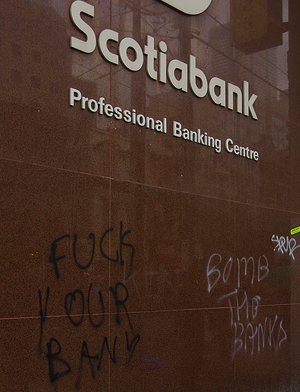STORY posted on June 27, 2010 by dawn
G-20 Nations: Race to the Bottom will Continue
A critical analysis of the G-20's Toronto Declaration
As the G-20 summit winds down behind the fences surrounding fortress Toronto, there are at least 560 folks in jail, and anyone left out on the streets is facing detentions, beatings, searches and arrests.
This is the context in which the Group of 20 gathered to write the Toronto Summit Declaration, a 27 page document released earlier this evening. An early critical reading of this text makes it evident that those who have taken great risk to mobilize against the G20 have done so on behalf of the health of communities, and the planet.
Because though the Toronto Declaration begins with a populist appeal to sustainability, job creation and financial regulation, it enshrines a commitment to force the poor and working class around the world to tighten their belts yet again as states implement strict new austerity programmes.
The Declaration proposes an ambitious new structural adjustment agenda, designed by the IMF and the World Bank, that aims to halve first world deficits by 2013.
Shoring up financial sector abuse of public funds is likely one of the most pressing concerns of publics, who have been denouncing the bank bail out all around the world. But the language in the Toronto Declaration does little to guarantee meaningful public oversight of the financial sector.
The Declaration welcomes the recently passed US Financial Reform Bill, which according to Newsweek "effectively annoints the existing banking elite," without putting a cap on executive compensation. Nor does the bill crack down on the banks that are supposedly "too big to fail," including J.P. Morgan, Goldman Sachs, Citigroup, Bank of America and Morgan Stanley.
Financial oversight will remain with elites, led by the IMF and other Multilatral Development Banks (like the Inter American Development Bank and the African Development Bank), which the declaration proposes should become "even stronger partners" in the future.
The Declaration indicates that G20 countries will pump $350 billion into Multilateral Development Banks, doubling their lending capacity, so that they can "focus on lifting the lives of the poor, underwriting growth, and addressing climate change and food security."
The move towards putting MDBs on the front lines of global lending could be a response to the growing global rejection of International Financial Institutions like the World Bank and the International Monetary Fund. This shift is reminiscent of a move away from global trade and regional agreements like the Free Trade Area of the Americas and the World Trade Organization, and towards smaller regional deals and bilateral agreements.
The Toronto Declaration makes a point of noting that Haiti's debt with International Financial Institutions will be cancelled, but avoids mention of the larger debt that the country owes to the Inter American Development Bank (IADB). Haiti owes less than $200 million to the World Bank and the IMF, while their outstanding debt to the IADB is upwards of $441 million. The IADB has also positioned itself to become the lead development bank behind the $10 billion reconstruction of the country.
In addition to an increased role for the IADB and other regional development banks, the Toronto Declaration promises more privatized "development financing" for low income countries. This could mean further subsidies for transnational corporations active in resource extraction and the maquila sector.
Language in the document about increasing global output, creating tens of millions of jobs, and reducing global imbalances flies in the face of recommendations for countries with higher debt loads to continue a regulatory race to the bottom by "maintaining open markets and enhancing export competativeness."
The Toronto Declaration also welcomed the launch of the Global Agriculture and Food Security Program, which proposes to create food soverignty between public and private partnerships. This flies in the face of demands from peasent groups, including Via Campesina, who stated at the end of 2009 that "The absence of the heads of state of the G8 countries has been one of the key causes of the dismal failure of [the November 2009 Food and Agriculture Summit]. Concrete measures were not taken to eradicate hunger, to stop the speculation on food or to hold back the expansion of agrofuels”"
The Declaration asks that the OECD, the ILO, World Bank, and the WTO facilitate their version of events by having them "report on the benefits of trade liberalization for employment and growth" at their next meeting. States are cautioned to stick with World Trade Organization measures and avoid new "barriers to investment or trade in goods and services." Potentially included among these barriers are new environmental legislation and new forms of taxation on corporate activity.
On the topic of climate change, G-20 countries that support Cophenhagen issued a weak call for other nations to "associate with it."
The site for the Vancouver local of The Media Co-op has been archived and will no longer be updated. Please visit the main Media Co-op website to learn more about the organization.

Comments
new world disorder
great article, i now understand more about what the G20 are attempting to do amidst the global economic crisis they have created. the future looks grim, and the only light appears to be burning pig cars in the dark shadows of the financial district of Toronto. get ready for class war...
Strengthening their Resolve too : re No Comments there fyi
The war logs also detail: ( what's probably coming here if you disagree more )
• How a secret "black" unit of special forces hunts down Taliban leaders for "kill or capture" without trial.
• How the coalition is increasingly using deadly Reaper drones to hunt and kill Taliban targets by remote control from a base in Nevada ...
http://www.guardian.co.uk/world/2010/jul/25/afghanistan-war-logs-military-leaks
Out our way no coverage by local media only Baby picts & kids
http://www.topix.net/ca/milton-on/2010/08/strengthening-our-resolve
http://www.topix.net/album/detail/ca/halton-hills-on-georgetown/COCHJ1CA...
http://www.insidehalton.com/searchresult?AssetType=Article&q=g20&r=all:1...